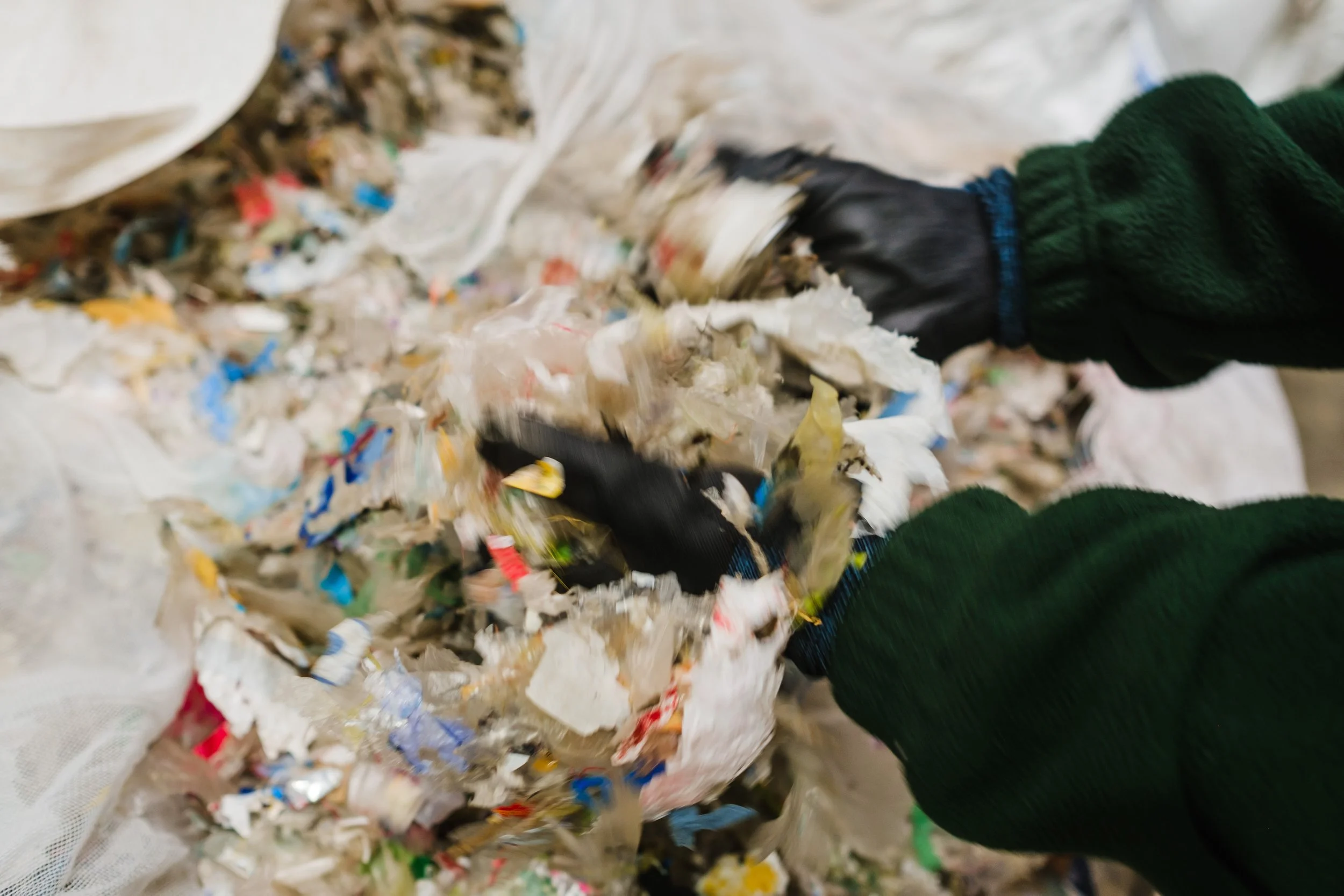Emerging bottlenecks, future solutions: what to get right for chemical recycling
Chemical recycling has come a long way in the past few years and, going by projects in development, this is only the beginning. The industry is accelerating towards clear validation of recycling technologies. However, two key factors are emerging as the main hurdles preventing dramatic increases in recycling rates in coming years.
By Geoff Smith
CHIEF TECHNOLOGY OFFICER
& CHIEF OPERATING OFFICER
Geoff leads the engineering function, focusing on technology design and development. He has seven years’ experience in pyrolysis plant development and operation.
Innovative technology with disruptive potential like chemical recycling (sometimes referred to as advanced recycling) has to jump over a number of hurdles before it can be considered commercially viable. Challenges include access to investment and at-scale R&D, but in the case of chemical recycling, proving that the technology can operate efficiently at large scale has been the primary challenge to date. Hurdles like these are familiar to the Itero team, they are challenges that Itero and the industry at large have traversed over the past decade or so.
While it is true that there are still obstacles for technology, there are currently no at-scale commercial plants operating at full capacity in Europe, development is moving forward at high speed, and with multiple technologies. There is significant chemical recycling capacity committed to come online in late 2025, including Itero's Brightlands plant.
Through many events and discussions with partners and peers, it has become increasingly apparent to me that although the demand for chemical recycling is extremely high, the most significant risk to the industry might no longer lie with the chemical recycling technologies themselves.
Rather, the most significant bottlenecks which threaten the industries potential for growth are feedstock availability and policy development.
Policy and Regulations
Policy and regulations can be an enabler or disabler for innovative technology. Policy makers and legislators will inevitably lag behind technological innovation, often despite their best intentions, and chemical recycling is one such case. We can, however, acknowledge that there is significant movement within governments to encourage and support the circular economy, both in the UK and Europe, notably the European Green Deal.
While there is much movement and discussion at the European Commission on the positive progress being made with the Commission's plans around the EU Green Deal and its relevance to chemical recycling, there is still a long way to go for the right policies for chemical recycling. Any new legislation will take time to implement and disseminate to member states*.
Chemical recycling policy discussions currently centre around two main key points:
Definitions and Regulations: While the definition for chemical recycling is clear in Europe, and being defined in the Waste Framework Directive “which includes chemical recycling under the definition of ‘Recycling’”, its definition can differ by EU member state, and often we see a country-by-country approach to regulations. An example is the inclusion/exclusion of chemical recycling in subsidy regimes, which is taking time to implement across a number of nations;
Mass Balance: the development of the mass balance approach for the allocation of recycled content in plastic goods derived from chemically recycled oils (see end of article for definition)**.
Despite some opinions to the contrary, there is widespread agreement that chemically recycling waste plastics that would otherwise go to landfill or incineration is a positive solution. This conclusion has been validated by a number of Life Cycle Assessments which have been published recently, despite some inconsistencies in how these reports represent their results.
Apart from Life Cycle Assessments, there are numerous reports and a wealth of data going into policy discussion, and I think it is incredibly important that we ensure these are representative and consistent, as the industry and this technology builds trust in its reputation. At the same time, it is important to keep in mind that chemical recycling is an industry which is still in its infancy with many years of optimisation to come. This first generation technology is trying to fit into infrastructure systems designed for other technologies, and is being compared to industries that have had decades to improve their efficiency and sustainability impact.
While even at this early stage chemical recycling has proven benefits for the plastic waste problem, with time and effort the industry will get better at reducing its environmental footprint, accepting the right kinds of waste, and improving plant efficiency measured both in terms of recycling rate and Greenhouse Gas impact. We should not hamstring the future benefits of recycling more plastics because we are apprehensive about new technologies today.
What should be acknowledged is that chemical recycling is not a silver bullet, but one of a plethora of solutions to our plastic waste problem. We should follow the hierarchy outlined by groups working on the plastics system: first reduce plastic use, then to reuse plastics, and where plastics are still the best option, to design for recyclability.
We are committed to a sustainable and circular future for plastics. Itero is a signatory to the UK Plastics Pact, a group working hard on this shared goal, alongside many of our peers, who may also be members of similar collaborative groups. We are also very clear that both the mass balance approach** and the adoption of chemical recycling as a method for recycling must be addressed as soon as possible in regulatory and policy environments.
All the same, action from policy makers needs to be faster. Every delay to the industry is directly translated to more plastic in landfill or the environment, more plastic incinerated and more crude oil extracted. Policy inaction directly translates to negative environmental effects.
“Every delay to the industry is directly translated to more plastic in landfill or the environment, more plastic incinerated and more crude oil extracted.”
Compounding factors
The second topic of concern and another potential bottleneck for the industry is the supply of waste plastic feedstock. Specifically, suitable feedstock for chemical recycling that does not remove feedstock available to mechanical recycling: what does feedstock look like and where will it come from?
Interzero, a German-based company providing closed-loop solutions and innovative plastics recycling, provided a valuable insight during the conference – a lot less waste is currently available for chemical recycling than the amount of announced capacity from plants in the future.
Itero, along with our industry peers, are aware that there is a disconnect when you compare the commitments and target of recycled content in packaging made by brands with current and projected availability of mechanically recycled polymer resins.
To quote CEFLEX (A Circular Economy for Flexible Plastics): “Today, end markets in Europe are only able to use mechanically recycled materials equivalent to ~30% of the 10-14 million tonnes of flexible packaging materials and other films(i) reported as placed on the European market annually.” This makes chemical recycling the only way to fill recycling requirements today and in the future. However, chemical recycling cannot just take any waste, collection and sorting is required for chemical recycling as well as for mechanical recycling.
There is more than enough waste produced in Europe to supply the announced capacity in the industry, but unless significant new investment is made into the upgrading of the waste collection and sorting infrastructure, feedstock supply could restrict the industry despite the resource being so widespread. It could also result in far too much waste to landfill and incineration through an inability to divert waste into recycling. Innovative ideas are needed in this space, but once again I believe in the calibre of Itero, our peers, and the wider industry to provide solutions to the problem in the near future.
Taking policy along with collection and sorting as separate and disconnected issues you could be left working harder and not smarter. Taking a systemic view, and seeing the potential for intersection across these areas, past bottlenecks become future solutions. In this instance, the right legislation could be the catalyst to accelerate feedstock collection and supply; for example, implementing flexible collection. With chemical recycling being a viable recycling route for these types of material, collection and sorting demand should follow.
This is in keeping with how we view chemical recycling and problem-solving. At its heart, Itero is an engineering company who believes current problems create opportunities for future innovative solutions.
Solutions are just under the surface
For me, the most encouraging part of discussing this topic with our peers and value chain partners is hearing projects that are committed and currently in-development, rather than only delivering aspirational goals and targets for the future. We find it hard to view those working on chemical recycling solutions as ‘competitors'. Any organisation who succeeds in this space will succeed in what the world needs and what we are working towards: more plastics recycled. We have every confidence that the industry will get the recognition and regulation it requires to be a meaningful part of the plastic waste solution. With the right systems in place, technology can work hand-in-hand with policy and existing industry to turn end-of-life plastic from a “waste” to a resource.
Pictured: feedstock at our West London Pilot Plant.
Interested to understand more? You can read more about our technology solutions.
*Waste management legislation is delegated to each member state, not decided at EU level.
** “Over the past years, the mass balance approach has prevailed in the chemical industry. As an important milestone on the pathway to a circular economy and bioeconomy, it has been designed to trace the flow of materials through a complex value chain. Since chemically recycled or bio-based feedstocks are typically blended in the manufacturing complex, physical segregation of recycled content is often practically and economically infeasible. The mass balance approach makes it possible to track the amount and sustainability characteristics of circular and/or bio-based content in the value chain and attribute it based on verifiable bookkeeping.” (ISCC).


